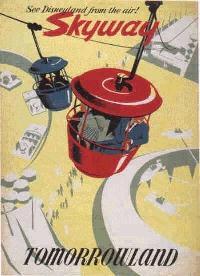

The Truth Behind Disneyland's Skyway Closure: Misconceptions And Facts
Misunderstandings often surround the reasons behind significant events, especially when they involve beloved attractions like Disneyland's Skyway. The closure of this iconic ride in 1994 sparked numerous rumors, with many believing it was due to an unfortunate incident involving a guest. However, the reality is more complex and rooted in economic factors rather than safety concerns. This article delves into the facts surrounding the closure, exploring the events that led to this decision and the implications it had on the park and its visitors.
Disneyland's Skyway was a cherished ride for many, offering stunning views of the park. Its sudden removal raised eyebrows and led to speculation among fans and visitors alike. In this article, we will clarify these misconceptions and present the factual basis for the ride's closure, focusing on the details of an incident that was wrongly attributed as the primary reason for its demise.
The story begins with an incident involving a guest who fell from the Skyway, which many believed triggered the ride's closure. However, this was not the case. Economic considerations played a vital role in the decision to dismantle the Skyway. Through an analysis of the events, we will understand why the ride was ultimately shut down and how it reflects broader trends in amusement park operations.
Table of Contents
- Claim Surrounding the Closure
- Status of the Claim
- Origins of the Closure
- The Incident Involving Randle Charles
- Economic Factors Behind the Closure
- Final Thoughts on the Skyway Closure
Claim Surrounding the Closure
The widely believed claim states that Disneyland's Skyway was closed due to a guest falling from the ride. This perspective gained traction after a 1994 incident where a man did indeed fall, leading many to connect these two events. However, this connection lacks substantial evidence and overlooks the broader context of the decision-making process at Disneyland.
Status of the Claim
The status of this claim has been investigated and ultimately marked as false. Investigations revealed that the Skyway's closure was not directly tied to the incident, and the reasons were more intricate than a singular event. Understanding the distinction between perception and reality is crucial in this discussion.
Origins of the Closure
The origins of the Skyway's closure stem from various factors, including maintenance costs, staffing requirements, and overall visitor experience. The original claims suggested a safety concern, but the reality was that the ride was becoming increasingly difficult to manage efficiently.
The Incident Involving Randle Charles
On April 17, 1994, Randle Charles fell approximately 20 feet from a Skyway cabin, landing in a tree. Although he sustained minor injuries, this incident led to legal action against Disney, which many perceived as a reason for the ride's closure. However, it was revealed that Charles had jumped from the ride, not fallen, casting doubt on the narrative that linked this event to the Skyway's dismantling.
Economic Factors Behind the Closure
The decision to close Disneyland's Skyway was primarily influenced by economic factors. As the attraction aged, maintaining it became more costly, and its operational capacity was increasingly questioned. Disney's management had to consider whether the ride was worth the investment compared to newer attractions.
Final Thoughts on the Skyway Closure
In summary, the closure of Disneyland's Skyway was not a reaction to a single incident but rather a culmination of economic realities that the park faced. Understanding the truth behind this beloved ride's closure allows fans to appreciate the complexities of amusement park operations. As we reflect on this history, we recognize the importance of separating fact from fiction in the vibrant narrative of Disneyland.

Debunking The Lil Wayne Cancer Hoax: Facts Vs. Fiction
Unveiling The Mystique Behind The Winged Lion Statue At The United Nations
Fact-Checking Marjorie Taylor Greene's Claims On Solar And Wind Energy
